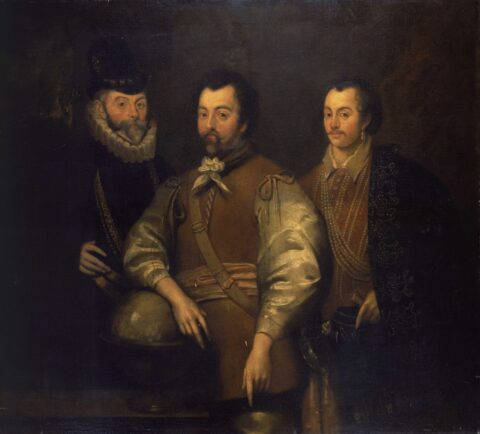At The Critic, Fred Skulthorp explains how British history is being taught in schools these days:

Sir John Hawkins (1532-1595), Sir Francis Drake (1540?-1596), and Thomas Cavendish (1560-1592).
Probably a copy of Daniel Myten’s’ painting of the same subject, now part of the Royal Museums Greenwich collection via Wikimedia Commons.
“Sir, was everyone in history a racist?” said Daniel one slow Thursday afternoon at my old school in North London. Daniel hadn’t put up his hand, so of course, I had to tell him off. Even worse, being in my usual teacherly bad mood, I wasn’t exactly Mr Chips with my response. What a silly question, I snapped, before going back to trying to teach a set of pandemic weary teenagers about the Reformation.
Daniel deserved a better answer than that. Not least because some version of his question has now worked its way onto the lips of the certain adults who run schools. The latest “yes” in a primary school in Lewisham saw an “overwhelming” majority vote to remove the stain of Sir Francis Drake’s name from the school. Who knows what arguments went into the decision, but one can only hope they delved a little bit more into his career than the BBC who initially served him up as a “16th century slave trader”.
The decision didn’t surprise me. I had briefly taught in another secondary school just down the road, and another in North London, where making the curriculum inclusive, diverse, decolonised, equal etc was all the rage. For me, Drake was a fascinating target. I had actually taught the man to a class of Year 8s. Funnily enough then, Drake was one of the few old white men of British history deemed more accessible — largely given his relationship with an escaped slave called Diego. According to Miranda Kaufman, whose book Black Tudors was gleefully worked into our history curriculum, Diego became Drake’s “right-hand man” in his various endeavours across the high seas.
This wasn’t enough to exonerate him in Lewisham. When it comes to slavery and being a dead white man, even flirt with it and you’re out. Beyond the expected uproar, the bigger issue here is the increasingly strange way we feel compelled to serve up our history to make it accessible for “minorities” in the name of “diversity, equality and inclusivity”.
Both schools I taught in during my short-lived career were some of the most diverse in London. This isn’t something that particularly interested me, but it certainly played on the conscience of some of my colleagues. One of the most cringe-inducing conversations I have ever had was with a fellow teacher, who on discussing changes to the curriculum in the name of “diversity” recalled something along the lines of: that they had looked down the register, seen the names and wondered how we might better tell their story. Presumably, this meant anything other than the usual fare of boring old “white” British history
What exactly is their story? As British citizens, their story is our story; our history, their history and vice versa. The attempts to presume exactly what these teenagers found relatable end up pretty disingenuous. Roman Britain? Ever heard of Ivory Bangle Lady? The Tudors? All old dead white guys, huh? Nope, check out this cool black trumpeter who was in the court of Henry VII! These are interesting curios, but sprinkling them throughout the curriculum all too often seemed to advance the misconception that Britain has always been a multiracial, multicultural society — something not only historically inaccurate but incredibly patronising to the children of second, third, even fourth generation immigrants.
This all came to a head during a unit on World War One, which our head of department insisted be based on the book The World’s War: Forgotten Soldiers of Empire by David Olusoga. The book is an interesting piece of revisionism about the role of colonial soldiers in WW1. In obsessing over race and teaching the Western Front, it does at some point have to contend with the fact that the vast majority who died there were, err … white men. In one particularly painful lesson, I ended up having to teach the Battle of the Somme by asking the class: what does the story of Chinese labourers reveal about World War One? Funnily enough, as it turns out, not that much! I’m sure being subjected to racial slurs whilst doing manual labour behind the front wasn’t much fun. But I felt something fundamentally dishonest, even borderline offensive, in prioritising their story over those of the Pals Battalions who went over the top that morning.












